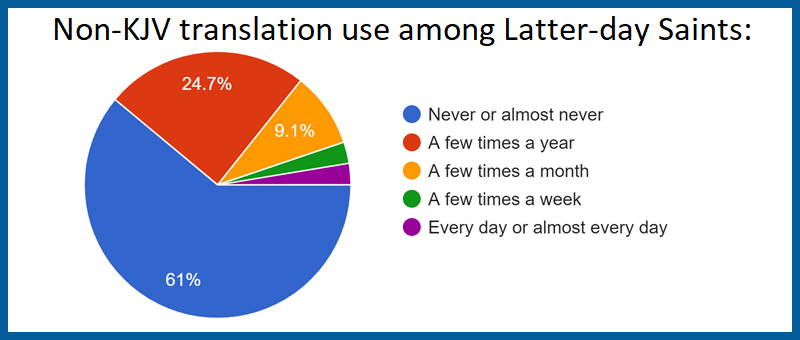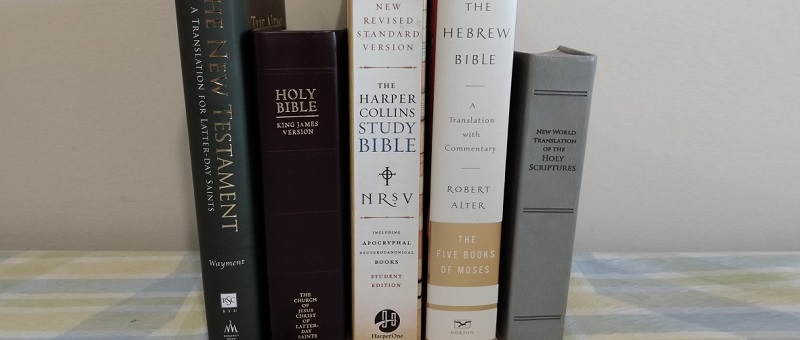Note: This post accompanies my post “The King James Version vs. Modern Bible Translations: Pros and Cons.”
English-speaking members of The Church of Jesus Christ of Latter-day Saints predominantly use the King James Version (also called the Authorized Version) for their Bible translation. But how much is “predominantly”? After numerous searches, I couldn’t find any data on the subject, so I conducted my own (very low-budget and un-rigorous) research project. Below are the results.
Methodology
I designed a simple survey in Google Forms. It had six total questions, but depending on people’s response to the first question, they saw only three or four questions.
I then shared this survey with family and close friends via email, as well as on my Facebook profile and several Facebook groups frequented by Latter-day Saints. The survey garnered 77 responses.
Participants
I did not track demographic information, but because of my venues of advertising the survey, most responses were from Latter-day Saints in the Intermountain West, especially young adults in the Provo area. Because of participation bias, those who used non-KJV translations were probably more interested in taking the survey after seeing it in their social media feed, likely biasing the results in that direction.
Results
How often do you use a bible translation other than the King James Version (KJV)?
| Response | Number of Responses | Percentage of Total |
| Never or almost never | 47 | 61.0 |
| A few times a year | 19 | 25.7 |
| A few times a month | 7 | 9.1 |
| A few times a week | 2 | 2.6 |
| Every day or almost every day | 2 | 2.6 |
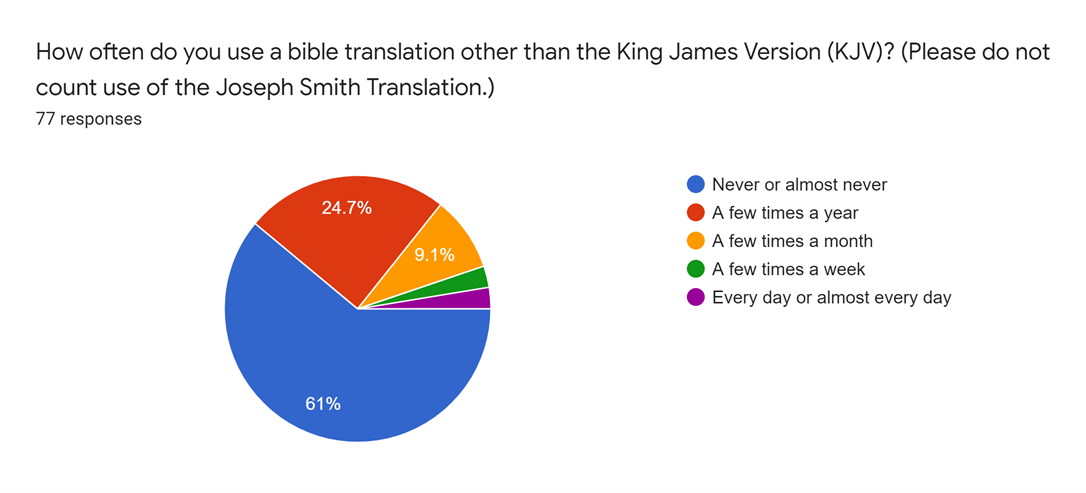
Those who responded “Never or almost never” or “A few times a year” were asked these two question:
Which of the following are reasons you predominantly use the KJV?
| Reason | Major Reason | Minor Reason | Not a Reason | Weighted Score* |
| The KJV is the English translation endorsed and preferred by the Church | 55 | 10 | 2 | 120 |
| The Church’s edition of the KJV has cross-references to other standard works and the JST | 51 | 14 | 1 | 116 |
| I am used to the language and format of the KJV | 38 | 17 | 8 | 93 |
| I don’t trust modern translations to preserve the correct doctrinal meaning of key passages | 32 | 17 | 16 | 81 |
| I don’t know which modern translations are better than others, or where to find them | 18 | 26 | 20 | 62 |
| I prefer the poetic and venerable language of the KJV | 18 | 20 | 25 | 56 |
*Weight: Major reason = 2, Minor reason = 1, Not a reason = 0
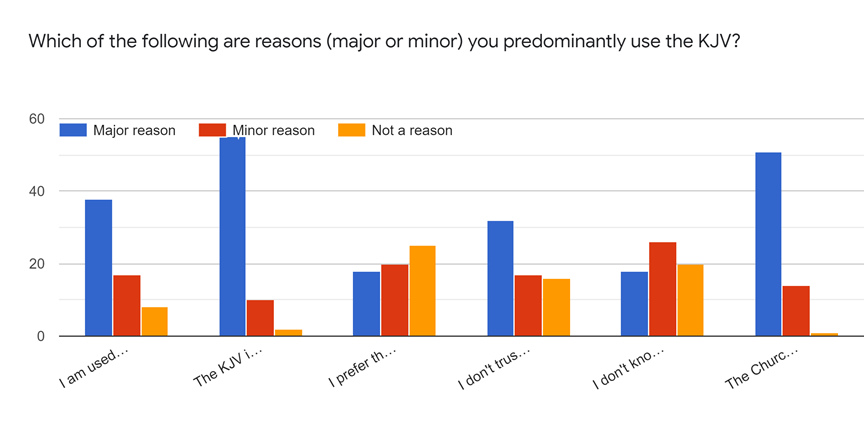
Any other reasons not listed above?
- Habit and easy availability/accessibility of the KJV (5)
- Translations often contradict each other (1)
- Modern translations have corrupted the text (1)
- “The Bible needs a singular translation language to unite all Christians and Bible readers, and the KJV is the most likely translation to accomplish that.” (1)
Other Comments
The following comments provide more insights into attitudes towards Bible translation use (grammar and punctuation standardized):
“The KJV is the one used in my childhood and I was gifted a KJV for my baptism, so it’s the one I’ve always used. I also was told as a child that other versions are ‘not of God,’ but in a college religion class I was taught otherwise. I really only go to other versions if I don’t fully understand the KJV, or if the KJV translation doesn’t fit with my understanding of the gospel.”
“The KJV is the only version I own, so it’s the most accessible for me.”
“I guess I feel like most other translations of the Bible in English have kind of corrupted the text. I suppose that there are probably great translations that refer to the original Hebrew and Greek. I also know that we have Joseph Smith’s translation, at least in part, included in our King James Version. I guess I feel like having this translation is enough to correct anything that is wrong with the King James Version. But then again, I probably have not learned enough about different translations to have a really well-founded understanding and opinion.”
“I have used other versions in an academic, scholarly setting, but I am no longer in that setting so I only use the one most accessible to me.”
“I have family members who aren’t Latter-day Saints who use other translations of the Bible, so when I study with them I sometimes reference those versions.”
“I feel like there are things preserved in the old language [Early Modern English] better than the new modern language. I prefer to use the other translations to supplement additional perspectives, and the KJV as the core.”
“The main reason is simply habit. I like other translations and have used them in religion classes, but have not incorporated them into my regular scripture study habits.”
“I never considered using other translations until I met my husband, who used them regularly. Before then I distrusted other translations.”
Survey respondents who reported using a non-KJV translation at least a few times a month were asked the following questions:
Which non-KJV translation(s) or editions do you regularly use?
| Translation | Respondents who use it regularly |
| New International Version (NIV) | 4 |
| New Revised Standard Version (NRSV) | 3 |
| English Standard Version (ESV) | 2 |
| New Living Translation (NLT) | 1 |
| New American Bible (NAB) | 1 |
| Robert Alter’s The Hebrew Bible: Translation and Commentary | 1 |
| Various | 1 |
Four of the nine respondents reported using at least two different translations.
Which of the following are reasons that you use non-KJV translations?
| Reason | Major Reason | Minor Reason | Not a Reason | Weighted Score* |
| Language: Easier to understand than the KJV | 7 | 2 | 1 | 16 |
| Scholarship: Based on more modern textual criticism and grammatical and lexical research | 5 | 2 | 2 | 12 |
| Formatting: Features like paragraph divisions, section headings, poetic stanzas, quotation marks for dialogue, etc. | 4 | 1 | 5 | 9 |
| Notes: More helpful or comprehensive footnotes, commentary, or other study aides | 2 | 2 | 5 | 6 |
| Habit: You grew up using non-KJV versions | 0 | 0 | 9 | 0 |
*Weight: Major reason = 2, Minor reason = 1, Not a reason = 0
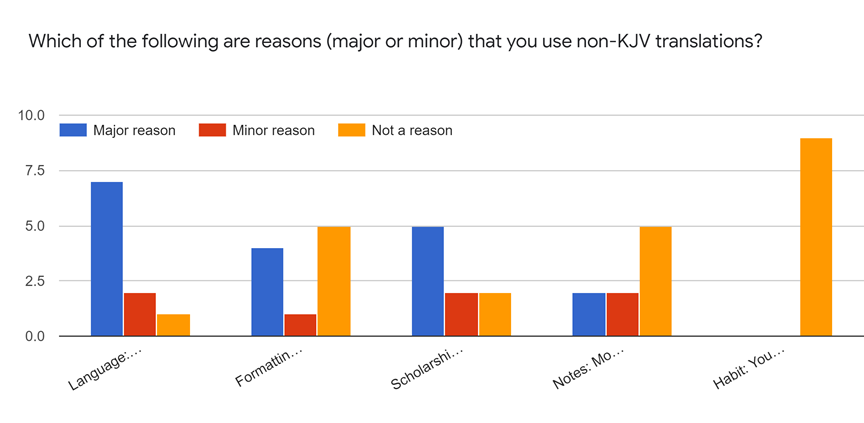
Any other reasons not listed above?
- “To see similarities and differences” (1)
- “Not to avoid the KJV, just to enhance my understanding” (1)
- “When I’m at prayer group with my Catholic friends, I use their Bible.” (1)
Summary
At least in the Intermountain West and particularly in the BYU campus community, most Latter-day Saints (~87%) rarely or never use non-KJV translations. The primary reason for using the KJV is because it is the translation endorsed by the Church of Jesus Christ and the one printed in the Church’s edition of the standard works; it is therefore the translation that members of the Church grow up with, are familiar with, and have easily accessible in printed and online formats. This predominance of the KJV also has generated a general unfamiliarity and in some cases a distrust of other translations.
Those Latter-day Saints who use non-KJV translations use them primarily to supplement, not replace, their KJV. They frequently were exposed to other translations in a college setting. Common translations used are the NRSV and the NIV. Primary reasons for their use are their more easy-to-understand language, their more accurate or updated scholarship, and to compare meaning across multiple translations.
